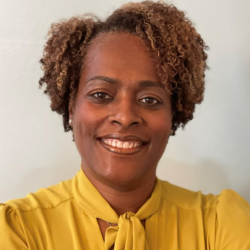This is a sponsored message.
One of the complex hurdles we face in our industry is ensuring trials include the diverse patients we serve. Historically, people from racial and ethnic minorities have been underrepresented in clinical research. We cannot advance scientific knowledge without an understanding of how our treatments work in all people. Put simply, to develop medicines for all, we must conduct research for all. Clinical trials must represent the broad diversity of patients we serve and enable equitable access.
This is a challenge globally, but especially in the United States. In some cases, underrepresented groups have logistical or financial burdens to participation. In others, barriers include fear or distrust of the medical and scientific communities, worries of how they’ll be treated, and not asked to participate in clinical trials. In my experience, it’s usually all the above.
When the complexity of clinical trials hits home
Solving the complexities around clinical trial diversity is a personal passion. When my father received a prostate cancer diagnosis, I knew clinical trials would be an important consideration in his treatment. My father lacked trust in the process; he became a very real reminder of how people in underrepresented communities often feel about clinical research. He was worried he’d be nothing more than a guinea pig and that the color of his skin would influence his treatment. It was difficult to convince him otherwise.
I’m proud to work for Merck, a company as committed to improving diversity in trials as I am. In my work, I’m an advocate for people like my father. Watching him worry was painful, but only strengthened my resolve to influence change across our industry.
We’re not there yet, but we are making important progress. It takes a comprehensive approach to increase diversity in clinical trials. We must tackle an array of issues, from reaching more diverse potential volunteers to participate in clinical trials to addressing barriers like finances. And of course, we must improve education so that people like my father feel more comfortable about what participation in a trial really means.
I’m proud of the progress we’ve made, and I’m especially proud that we are not trying to solve this challenging problem alone, but instead are partnering across the industry – it’s going to take all of us tackling a variety of hurdles to drive equitable access to clinical trials.
A longstanding commitment
Over the last five years, Merck has taken concrete steps to improve diversity in our studies. We require diversity plans for every late-stage trial and we use census data to prioritize placement of study sites in communities that have higher populations of people that have historically been underrepresented.
Perhaps most importantly, we have partnerships with community-based organizations, institutions of higher-education and professional groups to expand our outreach to meet and engage with patients where they are. We also invest in training and tools for researchers and others who can improve access broadly.
We have further to go, but it’s working. In 2022, we enrolled about 50 percent diverse participants in our clinical trials.
Representing clinical trial participants
One of the efforts I’m most excited about is our work to improve diversity among those who conduct our trials. I think about my dad, who would have felt more comfortable seeing people that looked like him running a trial.
In collaboration with ACRP, we recently launched the Early Talent Training Program (ETTP). The ETTP introduces high school and community college students to the clinical research profession. Starting in March 2023, 50 students will join the first cohort of the program and receive a Merck mentor to support them along the way. It’s an important step on the journey to more equitable trials.
We’re also using our commitment to OneTen to foster diversity among researchers. OneTen is a coalition of leading companies cultivating economic opportunities for Black Americans without a four-year degree. Over the next 10 years, OneTen aims to advance one million Black individuals into family-sustaining jobs through a “skills-first” approach. When we help provide skilled jobs in research, it’s a win-win.
Other partnerships support training for clinical research coordinators in underrepresented communities and even for physicians of color to become principal investigators.
Meeting people where they are
If we want to increase diversity, we also need to ensure our trials are where the people we need to reach live. Through a collaboration with Beacon of Hope – an initiative created by Novartis and the Novartis U.S. Foundation – we are operating clinical trials through four Historically Black Medical Schools: Charles R. Drew University of Medicine and Science, Howard University Medical School, Meharry Medical College, and Morehouse School of Medicine.
These trials will be conducted by investigators and managers of color with participants from underrepresented populations—exactly how trials built on strong community relationships should be.
Even when we are in the right communities, it doesn’t fully solve the challenges many trial participants face. Things many people take for granted, like the cost of a bus fare, can hinder access to the latest therapies for others.
That’s why we began exploring options to help people overcome such logistical barriers. In Florida in 2021, we piloted a mobile clinical research unit in communities with higher numbers of underserved Latinx people as part of our antiviral research. We could pre-screen potential participants and help the community understand more about the clinical trial process.
We’re also working with third-party organization, Greenphire, to ease transportation barriers for some of our trial participants. Greenphire uses its ClinCard to provide stipends and travel reimbursement, through a debit card. They also provide a travel concierge solution to arrange travel for participants.
In addition, the organization, Lazarex, aims to remove financial barriers for oncology trial participants by reimbursing out-of-pocket travel costs. Merck is a proud co-sponsor of Lazarex Cancer Foundation’s IMPACT program.
Our industry is working hard to conduct clinical research so that patients can receive the medicines they need regardless of color or creed. We must work together to implement programs and policies that ensure we reach everyone in need.
Ultimately, our research efforts must be defined by inclusivity and transparency. We’ll have succeeded when diversity in clinical trials isn’t a focused effort, but a proactive process woven into every facet of our trials.
Written by Adrelia Allen, Senior Director of Clinical Trial Patient Diversity, Merck Research




